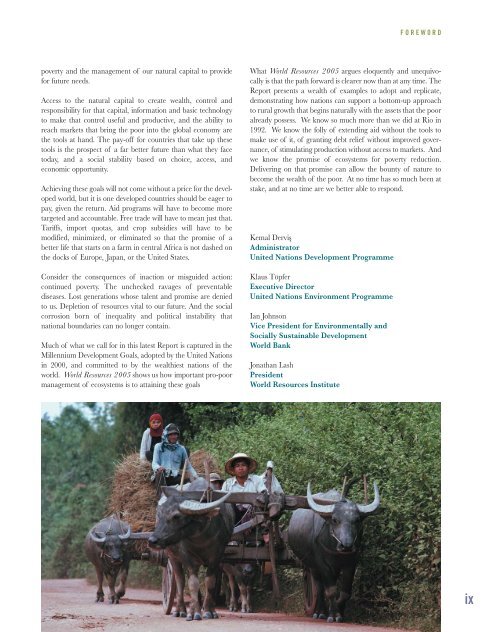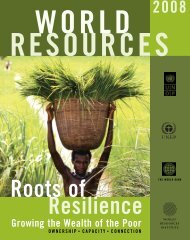jp8589 WRI.qxd - World Resources Institute
jp8589 WRI.qxd - World Resources Institute
jp8589 WRI.qxd - World Resources Institute
Create successful ePaper yourself
Turn your PDF publications into a flip-book with our unique Google optimized e-Paper software.
FOREW0RD<br />
poverty and the management of our natural capital to provide<br />
for future needs.<br />
Access to the natural capital to create wealth, control and<br />
responsibility for that capital, information and basic technology<br />
to make that control useful and productive, and the ability to<br />
reach markets that bring the poor into the global economy are<br />
the tools at hand. The pay-off for countries that take up these<br />
tools is the prospect of a far better future than what they face<br />
today, and a social stability based on choice, access, and<br />
economic opportunity.<br />
Achieving these goals will not come without a price for the developed<br />
world, but it is one developed countries should be eager to<br />
pay, given the return. Aid programs will have to become more<br />
targeted and accountable. Free trade will have to mean just that.<br />
Tariffs, import quotas, and crop subsidies will have to be<br />
modified, minimized, or eliminated so that the promise of a<br />
better life that starts on a farm in central Africa is not dashed on<br />
the docks of Europe, Japan, or the United States.<br />
Consider the consequences of inaction or misguided action:<br />
continued poverty. The unchecked ravages of preventable<br />
diseases. Lost generations whose talent and promise are denied<br />
to us. Depletion of resources vital to our future. And the social<br />
corrosion born of inequality and political instability that<br />
national boundaries can no longer contain.<br />
Much of what we call for in this latest Report is captured in the<br />
Millennium Development Goals, adopted by the United Nations<br />
in 2000, and committed to by the wealthiest nations of the<br />
world. <strong>World</strong> <strong>Resources</strong> 2005 shows us how important pro-poor<br />
management of ecosystems is to attaining these goals<br />
What <strong>World</strong> <strong>Resources</strong> 2005 argues eloquently and unequivocally<br />
is that the path forward is clearer now than at any time. The<br />
Report presents a wealth of examples to adopt and replicate,<br />
demonstrating how nations can support a bottom-up approach<br />
to rural growth that begins naturally with the assets that the poor<br />
already possess. We know so much more than we did at Rio in<br />
1992. We know the folly of extending aid without the tools to<br />
make use of it, of granting debt relief without improved governance,<br />
of stimulating production without access to markets. And<br />
we know the promise of ecosystems for poverty reduction.<br />
Delivering on that promise can allow the bounty of nature to<br />
become the wealth of the poor. At no time has so much been at<br />
stake, and at no time are we better able to respond.<br />
Kemal Dervis ¸<br />
Administrator<br />
United Nations Development Programme<br />
Klaus Töpfer<br />
Executive Director<br />
United Nations Environment Programme<br />
Ian Johnson<br />
Vice President for Environmentally and<br />
Socially Sustainable Development<br />
<strong>World</strong> Bank<br />
Jonathan Lash<br />
President<br />
<strong>World</strong> <strong>Resources</strong> <strong>Institute</strong><br />
ix

















